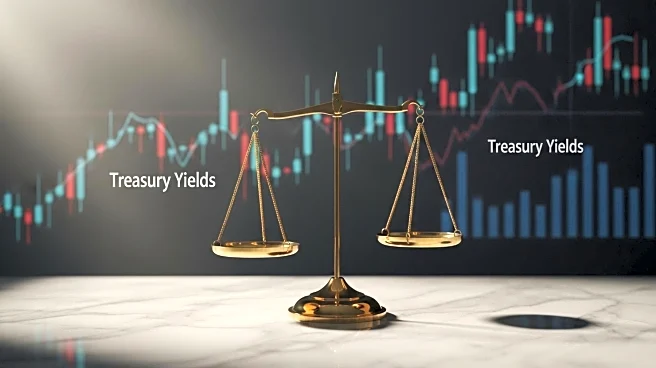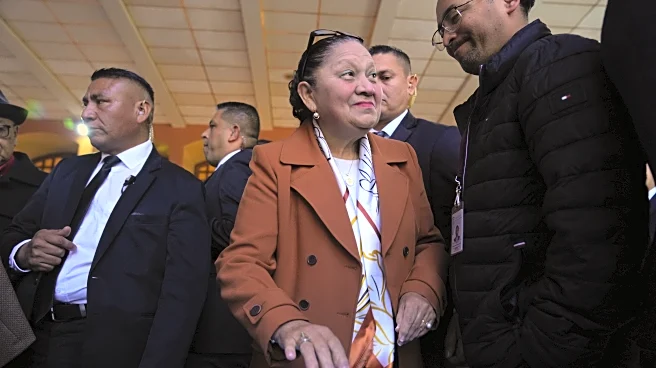What's Happening?
U.S. Treasury yields experienced a decline on Tuesday as investors anticipated a speech by Federal Reserve Chair Jerome Powell, which is expected to provide insights into future monetary policy decisions. The 10-year Treasury yield fell to a one-month low of 4.011%, while the 2-year Treasury yield decreased to 3.479%. The 30-year Treasury yield also saw a reduction, falling to 4.601%. This movement in yields comes amid renewed trade tensions between the U.S. and China, with investors seeking safety in government bonds. The White House is reportedly moving towards dialogue with Beijing, despite ongoing strains over rare earth export controls. Further discussions are anticipated during the IMF and World Bank meetings in Washington this week. Additionally, a ceasefire deal in Gaza, facilitated by President Trump, has contributed to improved sentiment in the market.
Why It's Important?
The decline in Treasury yields reflects investor caution amid geopolitical uncertainties, particularly the U.S.-China trade tensions. These tensions have historically impacted global markets, influencing trade policies and economic growth. The anticipated speech by Fed Chair Powell is crucial as it may signal future monetary policy directions, affecting interest rates and economic stability. Investors are closely monitoring these developments, as they could have significant implications for financial markets and economic stakeholders. The dialogue between the U.S. and China, if successful, could ease trade tensions, potentially stabilizing markets and fostering economic growth. Conversely, prolonged tensions could lead to market volatility and impact global trade dynamics.
What's Next?
Investors are awaiting Powell's speech at the NABE annual meeting in Philadelphia, which could provide clarity on the Federal Reserve's approach to monetary policy amid current economic conditions. The outcome of the U.S.-China discussions during the IMF and World Bank meetings will be pivotal in determining future trade relations and market stability. Stakeholders, including businesses and policymakers, are likely to react to these developments, influencing economic strategies and investment decisions. The ongoing ceasefire in Gaza, facilitated by President Trump, may also impact geopolitical stability, with potential repercussions for international relations and market sentiment.
Beyond the Headlines
The geopolitical tensions between the U.S. and China highlight the complex interplay between international diplomacy and economic policy. The rare earth export controls are a critical issue, as these materials are essential for various industries, including technology and defense. The resolution of these tensions could have long-term implications for global supply chains and economic partnerships. Additionally, the ceasefire in Gaza underscores the role of diplomatic interventions in conflict resolution, with potential impacts on regional stability and humanitarian efforts.










![Cortisol vs. Melatonin: The Biological War Happening Inside Every Night-Shift Worker]](https://glance-mob.glance-cdn.com/public/cardpress/binge-magazine-card-generation/spaces/US/en/discover-daily/images/ppid_7byehtbd-image-177082393426031154.webp)